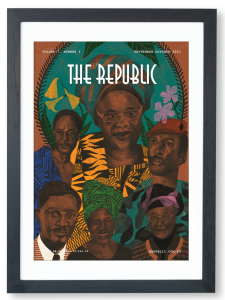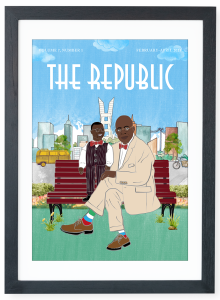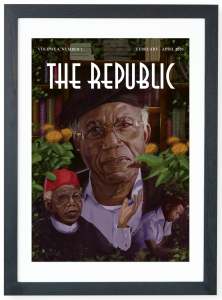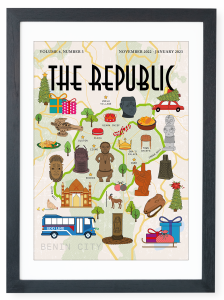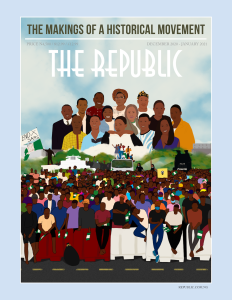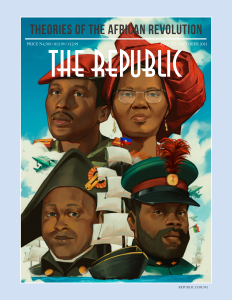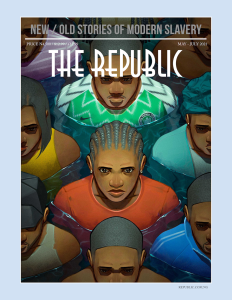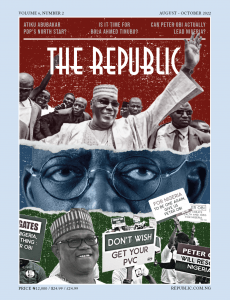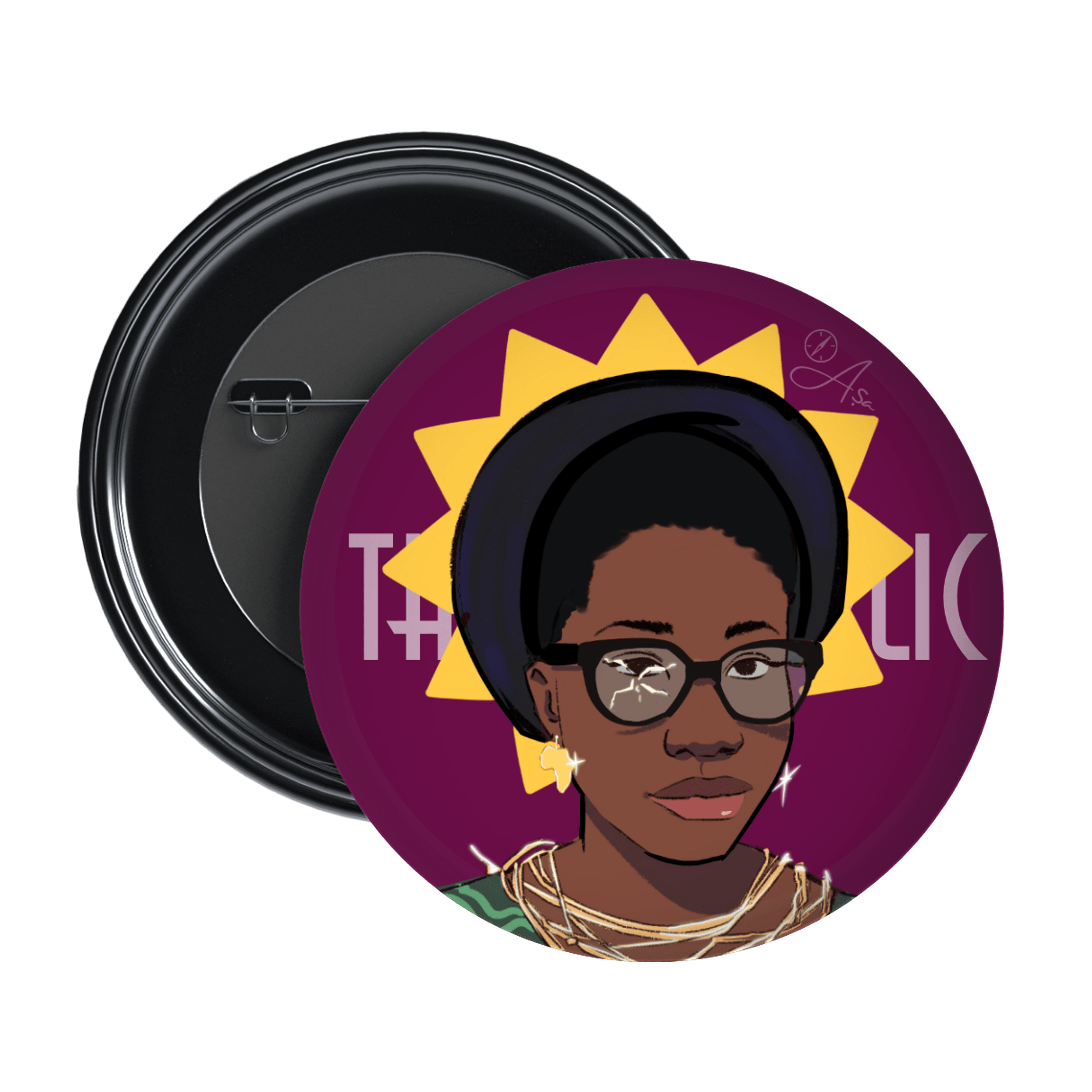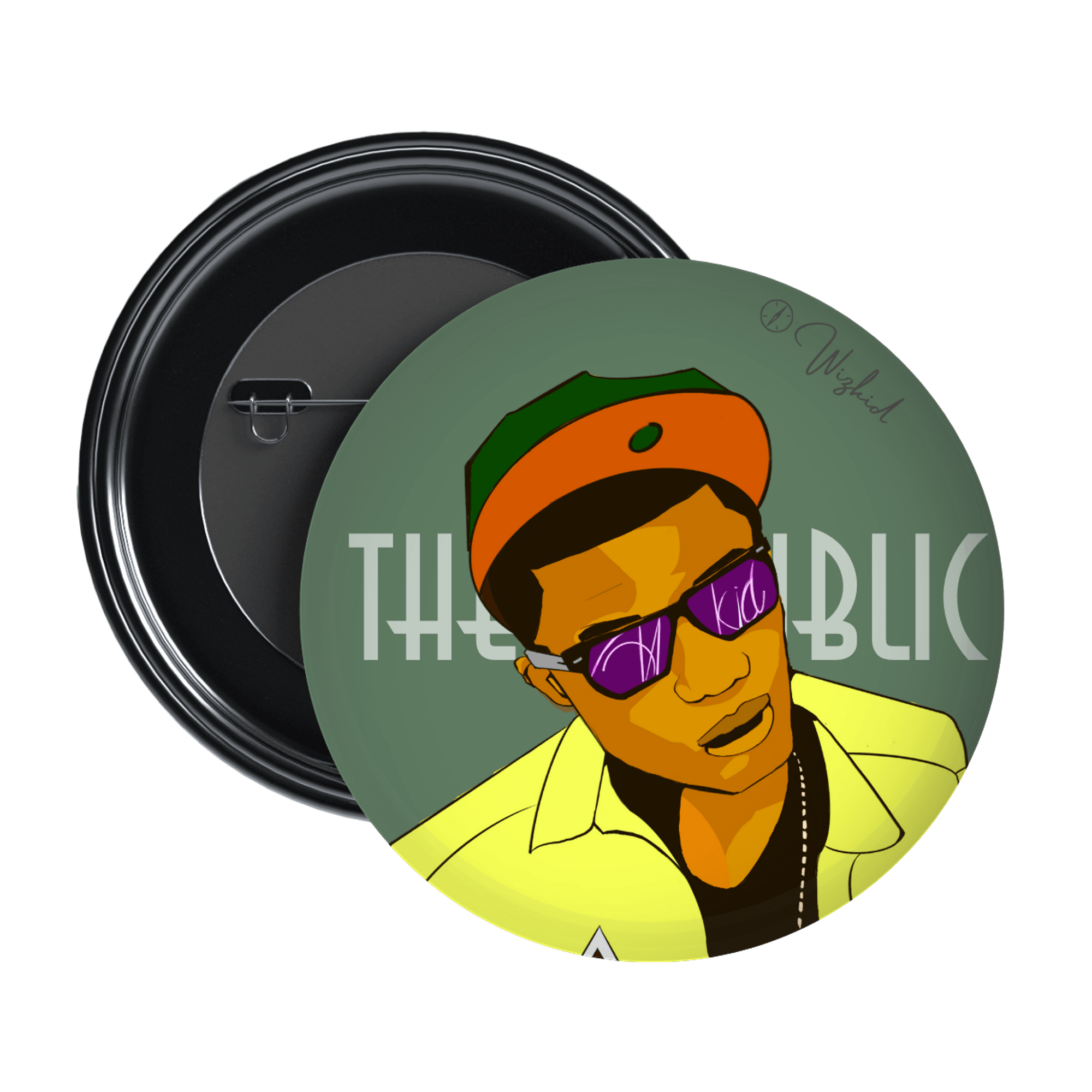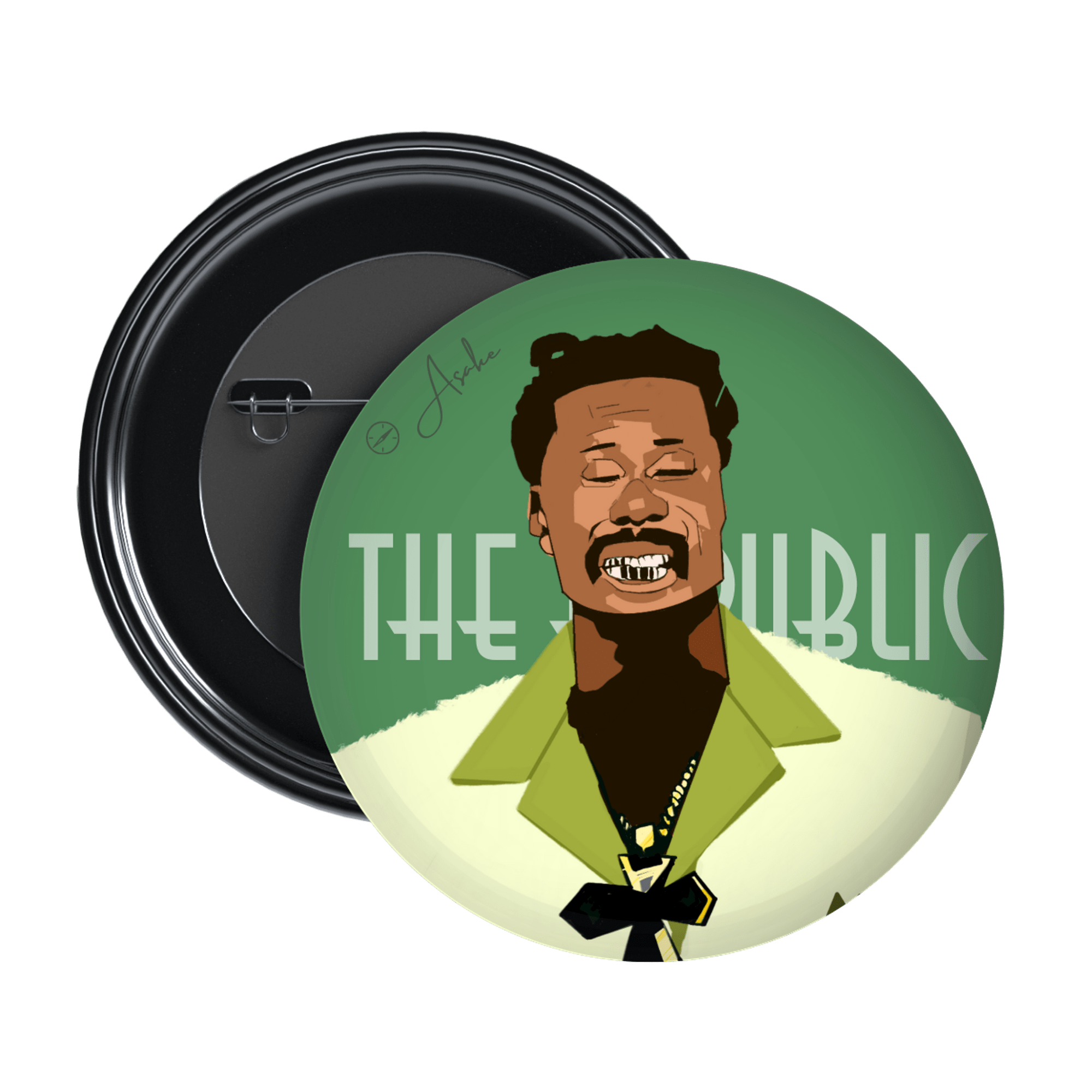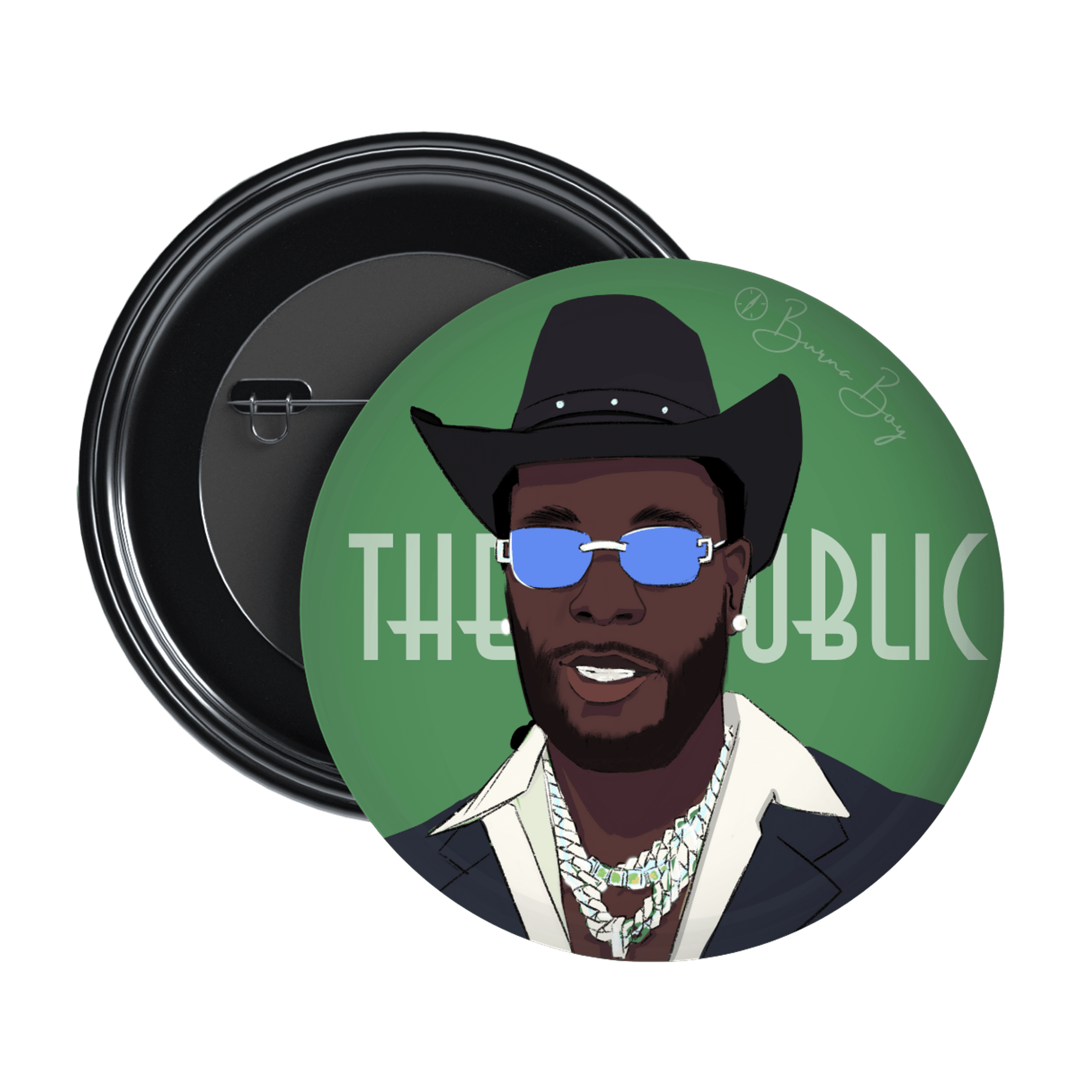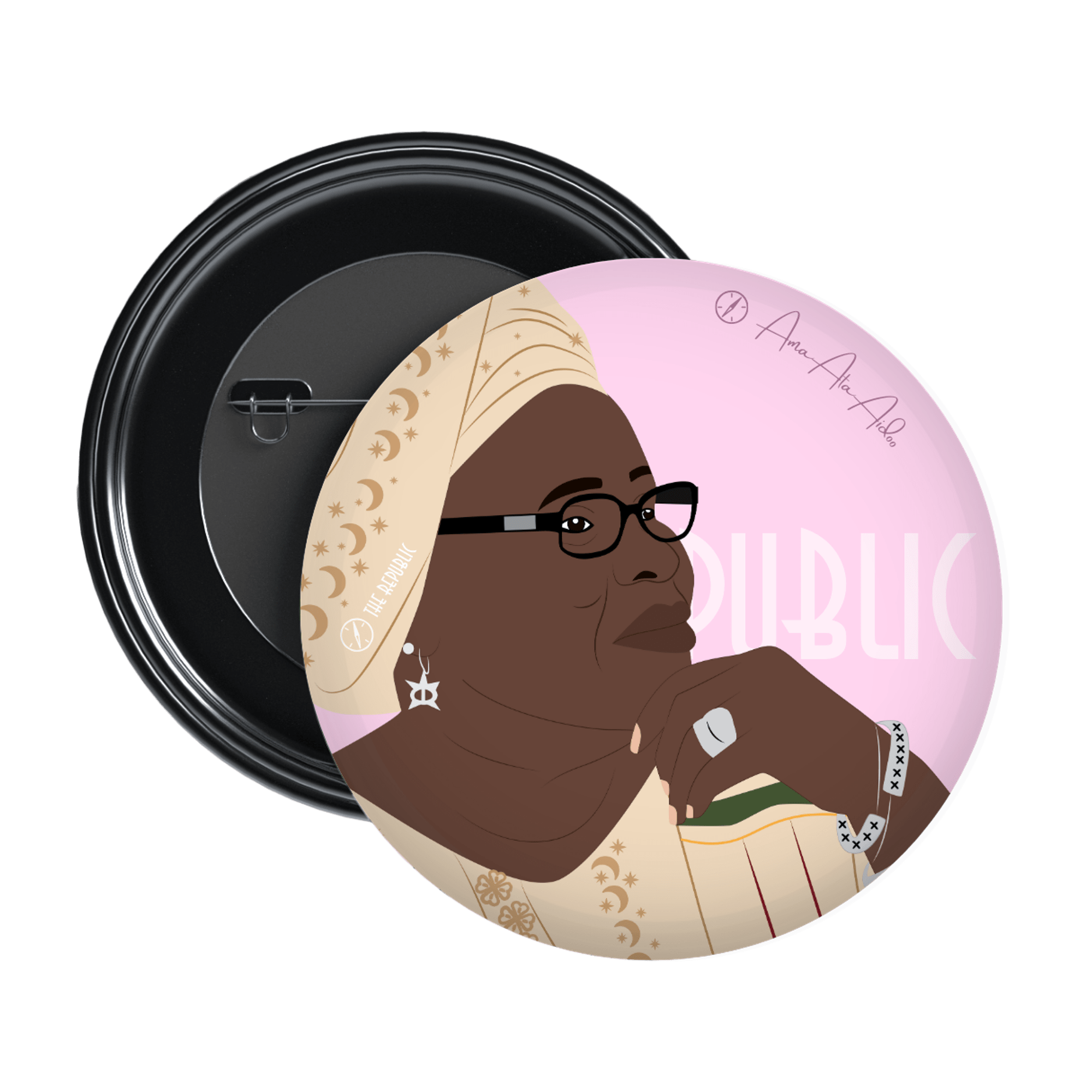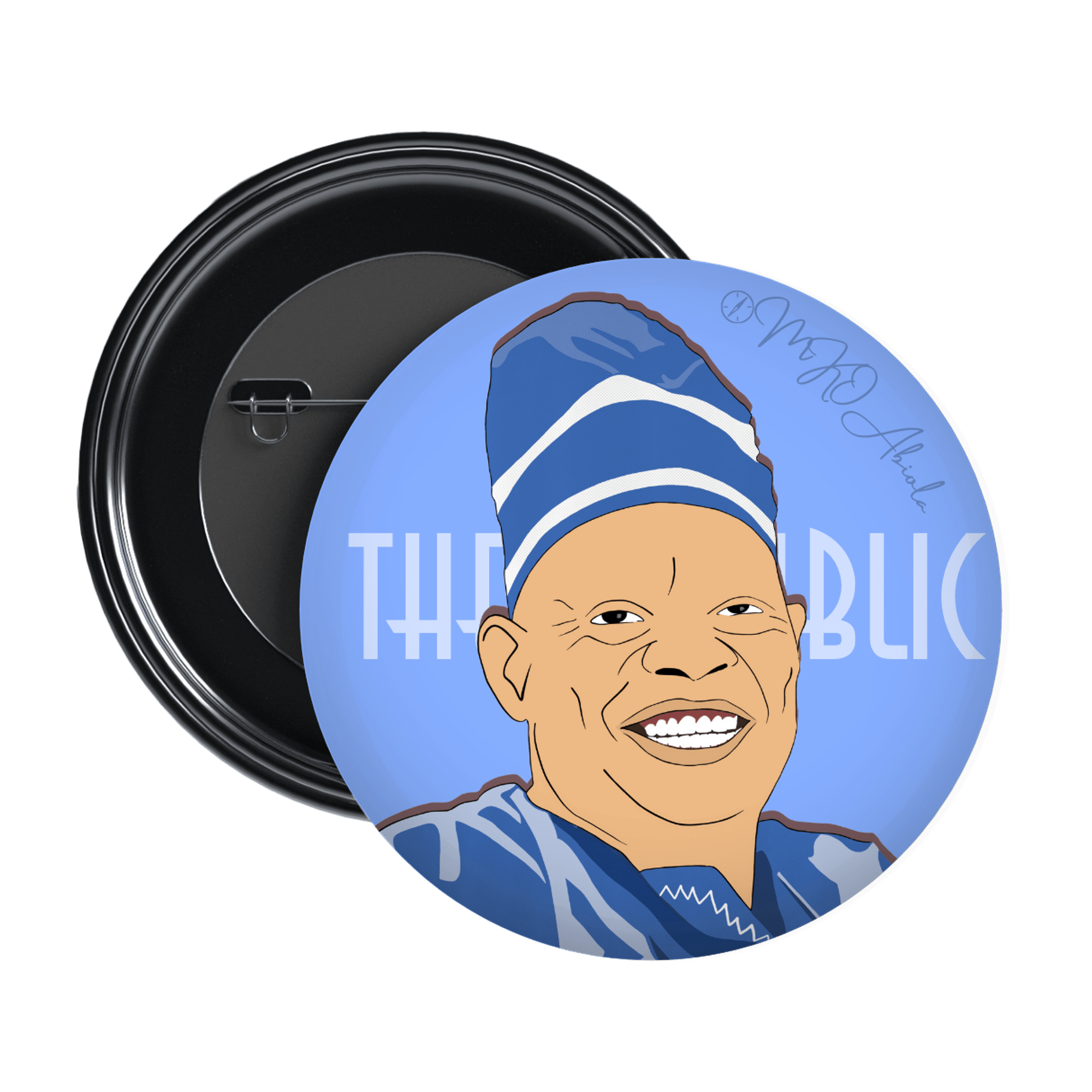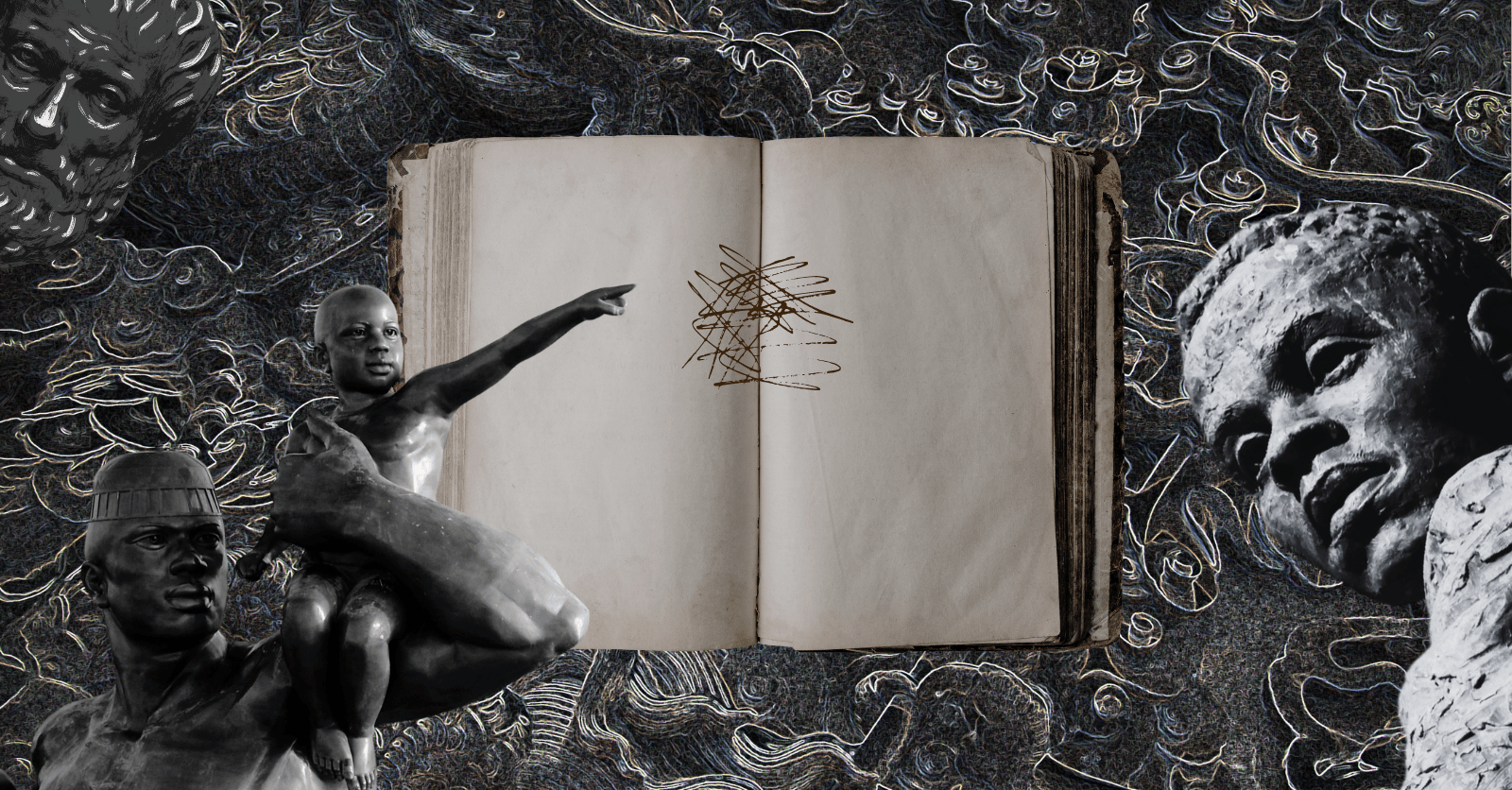
Photo illustration by Dami Mojid.
the ministry of IDEAS
African Philosophy Cannot Be a Thing

Photo illustration by Dami Mojid.
the ministry of IDEAS
African Philosophy Cannot Be a Thing
Philosophy, Plato writes in Theaetetus (155d), one of his Socratic dialogues, begins with wonder. Aristotle agrees in his Metaphysics (982b). Philosophers tend not to agree on a lot of things. But I think this is one of the few things philosophers are willing to concede, since to do philosophy is to try to answer questions, and to ask questions is to show that you wonder. Even though philosophy (and philosophers alike) aims to tackle root perceptual issues, the point of wonder is always situated. That is, philosophical investigations often interrogate the philosopher’s situated awareness. By situated awareness, I mean that the conditions that birth a person’s inquiry or wonder have to do with the social architecture that informs the person’s way of thinking—in fact how they think and what they think about.
Consider, for instance, a person who lives in a society where the people are yet to understand the basic elements of the universe—how the universe was formed and what the universe was formed from. I am inclined to say that the basic wonder of this person would be to investigate this. And this is the condition that we find the early Western philosophers such as Thales, Anaximander, and Anaximenes. Consider another instance: In this society, resources are scarce, and since there are no laid down moral rules, people don’t know how to conduct themselves and this affects how the resources are being used and shared. Simply put, this society is in a state of war of all against all since everyone is trying to survive and the only way to survive is to fight and keep the resources for yourself (and, maybe, your offspring, too). I suspect that the point of wonder, for a rational mind in that society, would be how to bring the people of that society together to converge on some basic moral and political principle that could lead to a welfare state and flourishing lives for its people.
Lastly, consider another society. In this society, the people with social powers are racist, and they subjugate people who don’t have the same phenotype. This subjugation manifests itself in the sort of social well-being the different groups (the racist and the other group) can acquire. It would be unkind, in some way, to expect that the content of the subjugated group’s wonder should not be tied to their oppression. The point I am making here is that one’s situation—perhaps, to put it clearly, ‘our’ situation—determines the sort of things or events one might wonder about.
WHAT DARIUS GOT WRONG ABOUT AFRICAN PHILOSOPHY
In a recent article in this journal, Darius Dauda Angwa missed this point about African philosophy when he attempted to answer the question ‘What is African Philosophy?’. Sadly, it seems to me that Angwa failed to respond to this question by offering a concept of African philosophy. What I see in Angwa’s essay is a rehash of the conceptual definitions that some philosophers have tried to give ‘African philosophy’. In his article, Angwa wrote that:
The fact that it is taking us about a hundred years to determine just what an African philosophy is, in the modern world, is indicative of something very important—and detrimental to us. It is important because it concerns the life and future of our continent, it is detrimental, because we still have not been able to do anything tangible to live above our current postcolonial situation—where defining our reality remains the task of the colonizer.
Angwa’s point here is an interesting one, but it strikes me as odd. It strikes me as odd for three reasons. First, there seems to be an apparent contradiction in Angwa’s claim. Just after the quote above, (in another paragraph) Angwa writes that ‘The content of philosophy in Africa ought to reflect the concerns of Africans’. Then he named-dropped some philosophers and philosophies such as Mao’s Marxism and Adam Smith’s interpretations of capitalism. I take it that Angwa is saying that these philosophies speak to the situated awareness of the philosophers who conceptualized them. But interestingly, Angwa’s concession here contradicts the quote above that asks people concerned about the question of what an ‘African philosophy’ is to neglect such question and just do philosophy. Angwa simply neglects the condition of situated awareness in philosophical inquiries when it comes to inquiries having to do with conceptual questions that define an African philosophy but granted the same situated awareness when it comes to the questions and topics that define Western philosophy.
The second point is only an attempt to drive home the first point: Angwa seems to be neglecting an important point of the history around ‘academic’ African philosophy and that is what leads him to a contradiction. Academic African philosophy is reactionary. It started as a reaction to Western philosophers (and I do hate to call them ‘philosophers’) such as Levy Bruhl, Kant, Hume, etc.., who often claim that ‘Africans can’t think’. Faced with these derogatory remarks, academic African philosophy started concerning itself with questions of whether an African philosophy exists; if it exists, what is it; who, and how African philosophy must be done for it to exist if it is not yet in existence. The situation around academic African philosophers at the time required them to investigate the situation that racist Western philosophers put them. Importantly, also, today people still assign lesser credibility to African philosophy than they do to what might be called Western philosophy. So, it might be a little bit disdainful to insist that Africans concerned with the meta-philosophic nature of an ‘African philosophy’ desist from doing so.
I have been calling it ‘academic African philosophy’ to gesture at the fact that it is inconceivable for me that a group of people would live together for more than 1500 years, and they didn’t wonder, ask questions, or try to solve the problems they encounter in their social lives. And this, we must note, definitely counts as a way of doing philosophy. For what is philosophy when it is reduced to contextualization alone that does nothing to affect our daily lives? I, in fact, think using the term ‘African philosophy’ broadly and not reducing it to ‘academic African philosophy’ reinforces the racist and colonial beliefs that since they weren’t written, Africans have no philosophy or a way of thinking before Western incursions. This, outrightly, is some sort of clusterfuck that only the West enjoy because it allows them to sit at the upper side of the socially constructed hierarchy.
Lastly, it also strikes me as odd how, to some extent, Angwa’s effort to depict current African philosophy as philosophically uncritical might have deluded him from not seeing (not to talk about understanding) the now vast contents of philosophy in Africa that reflects and centres the concerns of Africans. I, in fact, think it is a disservice to the effort Angwa might even be making—which is that the content of philosophy in Africa ought to reflect the concerns of Africans and desist from metaphilosophical investigations of what constitutes an African philosophy. It, for instance, neglects the copacetic philosophical works that many African philosophers such as Ajume Wingo have done to demystify the issues around contemporary liberal democracies. It also neglects Ikuenobe Polycarp’s work on African communitarianism. It also neglects the fine philosophical work that Abraham Tobi is doing on appreciative silencing in communicative exchanges. It even neglects my own recent effort to show how an African ethical model can inform alternative justifications for altruism. There are many names I could mention, but I am going to stop here since mentioning all the names of people doing these sorts of important work would require, possibly, a writing of eight-sized font that runs for more than a hundred pages.
shop the republic
AGAINST USING IDENTITY TO IDENTIFY AFRICAN PHILOSOPHY
I also think that Angwa misses the point when he says ‘Another interesting thing in all this is how that the process of defining an African Philosophy, is at its core a matter of forming an identity for Africa (and Africans).’ This strikes me as odd. Consider, for example, Marina Webb, who is a professor of philosophy at the University of Texas, in the US. Webb’s philosophical interest is traditional African communitarian ethics. I wonder if there is a sense in which Webb, a white woman, needs to conform to an African identity for her work to count as part of some sort of ‘African philosophical thinking’.
I, however, agree with Angwa when he dismisses Paulin J. Hountondji’s argument that the ‘content does little to qualify whether a philosophy is African or not, but the location/nationality of the doer of the philosophy [the philosopher] is what counts in qualifying an African Philosophy as distinct from any other.’ I think Webb’s case can also be applied to dismiss Hountondji’s argument here. But I fear that in an attempt to find something that distinctively categorizes an African philosophy, we are bound to lose both the world we should be interacting with and the world that should be interacting with us. How should we, for instance, tell Webb that because she lacks an African identity; or because her concerns are with traditional African communitarianism—which does not necessarily reflect present-living Africans’ concerns; or she lacks an African nationality, her works do not count as part of an African philosophical inquiry?
STRUGGLE FOR MAINSTREAM ACCEPTED NOT ENDEMIC TO AFRICAN PHILOSOPHY ALONE
Angwa (and many critics of an ‘African philosophy’) must also be careful what they wish for. For instance, Angwa argues that African philosophy is struggling to be accepted into the mainstream because it fails to connect with ordinary people (whatever that means). The problem with this line of argument is that Angwa thinks that this is endemic to Africans and ‘African philosophy’ (whatever that means) alone. I take it that Angwa thinks African philosophy’s counterpart, Western philosophy, and Western philosophers, connect with ordinary people. But that isn’t true. The recent defunding of philosophy departments in countries like the United States and England has been based on the belief of many people that Western philosophers’ philosophy does not connect with people. There is some sense in which the philosophies done to speak to the African situation speak to the lives of ordinary people more than how Western philosophers speak to ordinary people. How does higher-order logic connect with how ordinary people live their lives in the West? How many ordinary people in the West use the tools of Bayesian epistemology to measure the sort of credence they should assign to a proposition before believing it? How many ordinary people in the West think about Rawls’s veil of ignorance before acting morally or making political decisions? How many ordinary people think about David Lewis’s counterfactuals in the West? How many ordinary people think about Robert Pasnau’s notion of an ‘idealized epistemology’ before deciding if they should accept the limitation of their cognition before concluding that they don’t know? (Don’t get me wrong: These are very important philosophical works!) The philosophers’ work is to do philosophy. Relating to it is the work of the people who are so inclined.
Angwa (and other thinkers like him) must answer these pressing questions before they proceed to critique that there is a philosophy that doesn’t central the concerns of some social groups. Of course, there is a sense in which these Western philosophers’ philosophical investigations centre the lives of ‘ordinary’ people. But I don’t think it centres their everyday concerns.
shop the republic
AGAINST THE ‘IDIOT VETO’
Angwa also gestured at what I would like to, at this point, call an ‘idiot veto’ when he said that
Other questions often asked include; does African Philosophy live up to the ‘modern’ practice of philosophy as found in Western (and even non-Western) universities (and academic discourse)? Are oral traditions qualified to be categorized with modern written philosophical traditions? Who were the ‘philosophers’ that developed these African Philosophies and while developing these ideas, did they confirm themselves as doing philosophy or refer to the ideas as philosophical?
I take it that these aren’t Angwa’s questions since these questions are often the sort of questions I hear in the corridors of many philosophy departments that I have been to. What does it even mean to ask ‘Does African Philosophy live up to the ‘modern’ practice of philosophy as found in Western (and even non-Western) universities (and academic discourse)?’ I wonder, for instance, what delusions one must hold to their heart to read the vast literature on African communitarian ethics and believe that it deserves lesser credibility than the many ethical theories in Western philosophies. The question ‘Are oral traditions qualified to be categorized with modern written philosophical traditions?’ is another of such an idiot veto. Socrates, arguably the greatest Western philosopher (‘Western’ because I struggle to understand what makes Socrates greater than Orunmila, the Yoruba’s Orisha of Widom, knowledge, and divination), left no philosophical writings. It is Plato, his follower, who contextualized some of Socrates’ dialogue and thus, the philosophies accorded to Socrates today. How is this any different from when a wise man in an African village offers philosophical insights and this is carried on to the next generations until somebody else writes about it?
The last question in that quote also strikes me as odd. If I propound a theory of justice that I think offers better ethical principles than whatever theory of justice that is being applied in our current society, I didn’t confirm to you that it is a philosophical idea. Does my non-confirmation of the philosophical status of my theory thus render my theory philosophically irrelevant?
shop the republic
AFRICAN PHILOSOPHY CANNOT BE A THING
Angwa (and the thinkers like him) must be careful: African philosophy cannot be a thing. It should, like Western philosophy, be a vast of things. Angwa agrees with the Eritrean philosopher, Tsenay Serequeberhan that ‘In the history of philosophy and presently, ethnic qualifiers have been and are still operative with regard to designating specific philosophical perspectives.’ But this, too, isn’t true. Ethnic qualifiers do not designate a philosophical perspective. What ethnic qualifies do is to help us identify the group that a philosopher might be said to belong to. For instance, we say Aristotle’s philosophy, Plato’s philosophy, Kantian philosophy, etc. But when we use the term ‘Western philosophy’ or ‘Western philosophers’, the point is not to identify the philosophical perspectives of the Western people who do philosophy, instead, it is to group and identify some set of people who do philosophy within that broader category. Ditto when we say Christian philosophy or Islamic philosophy. The point is not to identify the philosophical perspectives of philosophers working in that tradition, the point is to group them in the broader category of Christian or Islamic philosophical inquiries.
To make sense of why African philosophy cannot be a thing. Consider, for instance, that I have racist intuitions and I believe that Yoruba people are the superior social group and other social groups—Igbo, Chinese, Americans, etc.—are inferior. It will be a disservice to Yoruba philosophy that its ‘juncture of meaning’ is informed by my racist philosophical perspectives rather than a broader category under which my philosophical perspective can be identified. To ask African philosophy to be a thing (defined by people, content, or methods) is to deny it the possibility of being philosophy at all. To ask it to be a thing is to deny it the possibility of speaking to (both African and non-African) lives⎈




